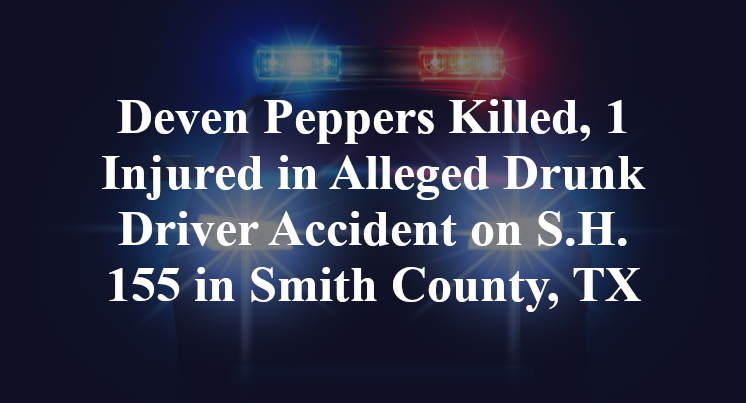Deven Peppers Killed, 1 Injured in Alleged Drunk Driver Accident on S.H. 155 in Smith County, TX
UPDATE (October 24, 2025): Recent reports have been released which state that 28-year-old Devon Peppers was ultimately unable to overcome the severity of his injuries, having later been declared deceased. Also reported was the fact that the 53-year-old man who had been behind the wheel of the Sonata was allegedly under the influence of alcohol at the time of the wreck. Authorities have recommended charges of Driving While Intoxicated and Manslaughter against him. No further information is currently available. Investigations remain ongoing.
Tyler, TX — August 22, 2025, Deven Peppers and another person were injured in a car accident at approximately 12:30 a.m. along State Highway 155.
According to authorities, 28-year-old Deven Peppers was traveling in a southbound Hyundai Accent on S.H. 155 just north of I-20 when the accident took place.

Officials indicate that, for as yet unknown reasons, the Accent failed to yield the right-of-way to oncoming traffic as it attempted a left turn into a private drive. A collision consequently occurred between the front-end of the Accent and the front-end of a northbound Hyundai Sonata occupied by a 53-year-old man.
Peppers reportedly sustained serious injuries over the course of the accident. The man from the Sonata suffered minor injuries, as well, according to reports. Additional details pertaining to this incident are not available at this point in time. The investigation is currently ongoing.
Commentary
When alcohol plays a role in a fatal crash, the conversation often stops at the driver who’s been charged. But in many cases, that’s only one part of the story. In this incident, authorities now allege that the man behind the wheel of one of the vehicles was intoxicated at the time—and that another person, Devon Peppers, later died from injuries sustained in the wreck. That’s a serious development, and it brings up a question that isn’t always asked but should be: Where did the alcohol come from, and should someone have stopped serving him before he got behind the wheel?
Texas law doesn’t just hold impaired drivers accountable. It also allows for legal action against bars, restaurants, or other alcohol providers who serve someone who is obviously intoxicated and then allow that person to leave and endanger others. That’s the core of what dram shop law is designed to address. It’s not just about assigning blame—it’s about recognizing that some of these crashes begin long before the ignition turns over, often with a poor decision made by someone in the business of selling alcohol.
In most DWI investigations, the focus tends to remain on the crash itself—who turned where, what traffic laws were violated, and whether charges are appropriate. But if a person was visibly impaired and still being served alcohol just before the wreck, that matters too. It matters to the injured party. It matters to the family of someone who didn’t survive. And it matters to public safety, because ignoring overservice only increases the risk that the same mistake will be made again.
At the end of the day, crashes like this don’t happen in a vacuum. The law recognizes that—and provides tools to pursue answers that aren’t always obvious, but are often crucial.
Key takeaways:
- If the driver was overserved at a business while already showing signs of intoxication, that business could be liable under Texas dram shop law.
- Even when a crash appears to stem from one party’s driving decisions, alcohol involvement can add a layer of accountability that deserves investigation.
- Texas law gives families and injured parties the right to ask where the alcohol came from—and to seek answers and remedies if a provider played a role.

*We appreciate your feedback and welcome anyone to comment on our blog entries, however all visitor blog comments must be approved by the site moderator prior to showing live on the site. By submitting a blog comment you acknowledge that your post may appear live on the site for any visitors to see, pending moderator approval. The operators of this site are not responsible for the accuracy or content of the comments made by site visitors. By submitting a comment, blog post, or email to this site you acknowledge that you may receive a response with regard to your questions or concerns. If you contact Grossman Law Offices using this online form, your message will not create an attorney-client relationship and will not necessarily be treated as privileged or confidential! You should not send sensitive or confidential information via the Internet. Since the Internet is not necessarily a secure environment, it is not possible to ensure that your message sent via the Internet might be kept secure and confidential. When you fill out a contact or comment form, send us an email directly, initiate a chat session or call us, you acknowledge we may use your contact information to communicate with you in the future for marketing purposes, but such marketing will always be done in an ethical way.